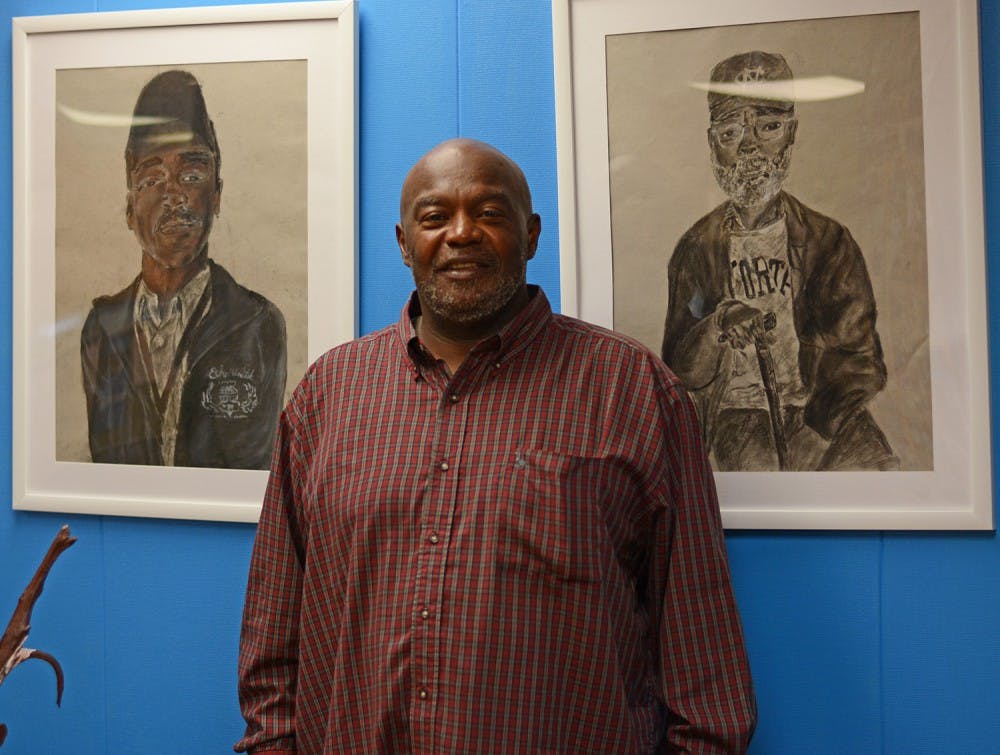She says that some residents are here after prison. Felonies linger. They make it excruciatingly hard to get a job. Anthony said she’s seen people go from gang members to peer counselors.
“I think the guys are surprised when I don’t judge them for their past. You’re here now, let’s move on.”
People have a hard time admitting they’re here. But there are so many reasons they are, she says. Jobs, family issues, disability.
“If they’re waiting on a disability check, it can take years to come through. We can’t just leave them out on the street.”
***
It could be an airport — faces stream by and giant windows give way to glass buildings and green courtyards — then a voice over the address system: “Adult rapid response team to building two.” You’re in the right place. On the way to interview Craig Longnecker at N.C. Memorial Hospital.
Longnecker is here to pick up medicine for his girlfriend. He’s more patient than she is, he says. He’s here once a month for his own sake, though, to change out his feeding tube.
Three years back, after his third divorce, struggling with addiction and homelessness in Leasburg, North Carolina, Longnecker came to Chapel Hill’s IFC shelter.
“Chapel Hill, as far I’m concerned, advocates and does more for the homeless than any other environment around,” Longnecker said.
In 2015, a community social worker helped Longnecker get disability money — money that helps him afford to live on his own.
Acid in his stomach ate through the stomach wall and poured into the heart cavity. His heart stopped. He doesn’t remember calling 911, but he did. He left the hospital with a stomach pump.
“Everyday you’re not that much further from losing the roof over your head ... It takes time. You have to be patient.”
To get the day's news and headlines in your inbox each morning, sign up for our email newsletters.
He considers his past, rife with profound failures, personal struggles and moments of success, to be a strength. He can relate to and help people in hard times, people with demons, people who have experienced pain, people who have caused it.
Chapel Hill, then, is a good place to be.
“You’ve got the college here. You’ve got students working in social services ... They come into the (Community Empowerment Fund), and they put the time and effort into it.”
For people who are experiencing homelessness and are motivated to change their situation, he encourages seeking out all available resources. Be patient, he says, and eventually, a door will open.
“If you listen to the right people, speak to the right people, associate with the right people — you’re going to go places.”
Sometimes, he said, it’s the little things about this community that mean a lot.
“I can walk down the road and say, ‘I’m not going to get addicted to something,’ because I can see a smiling face every day — a student, some smiling face coming at me — and I can say ‘Hi’ and never see them again, but I’ve been affected by that positive attitude.”
You wish him luck. His girlfriend is waiting for her medicine at home.
***
Anthony Sharp has big hands, and he uses them when he talks.
Sharp is a native of Chapel Hill. In 1978 he was an All-American as a running back and linebacker for the Chapel Hill High School Tigers. He didn’t worry about his grades, and no one around him did either.
He had a son at a young age. He became a single father. As his household expanded to include another son, a nephew and the son of a friend, he had to go to work.
He worked two jobs at UNC as mail carrier and assistant manager for the housekeeping department.
“It consumed my life, just taking care of the boys,” Sharp said.
A wave of layoffs hit in 2006, and he lost the mail carrier job. The severance check helped. In 2013, he lost the support staff job.
When it rains, it pours. Sharp’s dad died. The money ran dry and he lost his house. When a five-month job at a solar company ended, he slept on his younger sister’s couch.
The void of joblessness left space for cynicism and depression to encroach, he said. He smoked weed as days came and went. Job applications went out with his name on the header, but his sister was doing it for him.
“For some reason I was scared of everything,” he said. “I thought I couldn’t accomplish anything.”
For Sharp, walking into the IFC shelter, like he had seen many before him do, was like admitting something.
But his sister wouldn’t stop pushing him. February 2014, he walked into the shelter. They asked if he wanted to join the program.
Clean the breakroom. Empty the trash. Skills group: How to find an apartment. A construction job.
“I knew I was mentally and physically getting better,” he said. “I was exerting myself and doing things on my own.”
Sharp became a leader. He earned honors and rewards. He was able to get dental work. The material rewards helped nurture his confidence.
When it rains, it pours. UNC took notice of what he was doing and hired him back.
In April 2015, 14 months after he entered the shelter, Sharp moved out and into a new place of his own.
“I’m not scared of anything,” he said. “I’ll jump in and do anything.”
Now, he’s giving back. Sharp is the only former shelter resident on the IFC Board of Directors. In a room of doctors and lawyers, he feels valued, having gone through the shelter himself.
Sharp now works two jobs, 14 hours a day. He has clarified his purpose to himself and to his community. He goes home every night and turns a key.
enterprise@dailytarheel.com




